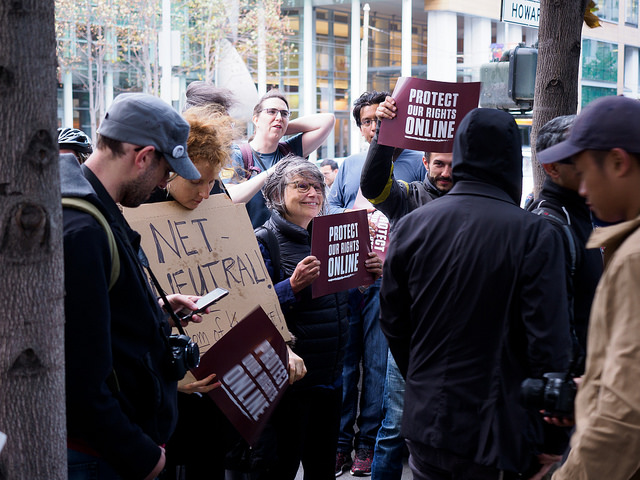The December 21 deadline for Congress to overturn the Federal Communications Commission’s repeal of net neutrality is closing in, and despite last-ditch appeals from activists and representatives who are passionate about the issue, there is little hope there will be any action before the end of the year.
The FCC under Chairman Ajit Pai, a former Verizon lawyer appointed by Donald Trump, announced in December of 2017 that it would repeal Obama-era regulations that enshrined net neutrality into law.
The new rules went into effect in June, and Congress is running out of time to overturn them before members return home for recess and a new Congress is seated on January 3.
The original deadline to overturn the FCC’s new rules was December 10, but a showdown between Democrats and Republicans over a funding resolution to keep the government open has extended the window.
What is Net Neutrality?
Net Neutrality is the principle that internet service providers (ISPs) like Comcast and Verizon should not be able to block or slow down traffic to certain websites or prioritize some content over others.
The FCC under President Barack Obama in 2015 reclassified the status of ISPs in order to regulate the internet like a public utility and uphold net neutrality.
Without those protections, ISPs can theoretically block or slow down traffic to websites that compete with ones they prefer or compel customers to purchase access or increased speeds to certain websites, effectively destroying the open nature of the internet.
Public opinion polls have repeatedly shown that net neutrality is near-universally popular among liberals and conservatives alike.
A year ago, Sen. @RonWyden (D-OR) explained the importance of net neutrality, which the FCC reversed in December 2017.pic.twitter.com/w8IrD07072
— Zinhle (@simplyzinhle) December 4, 2018
Before making its decision to repeal the regulations, the FCC solicited comments from the public and received about 22 million replies. An analysis from Stanford University found that about 21 million were fake or automated and that 99.7 percent of authentic comments were supportive of net neutrality.
Buzzfeed News reported last week that the Justice Department is investigating the fake posts.
Special Interests
In May, the Senate passed a resolution 52-47 that would overturn the FCC’s repeal of the net neutrality regulations.
Despite the overwhelming public popularity of net neutrality, the resolution has been denied a vote in the House and remains stuck in the Subcommittee on Communications and Technology.
Republican Marsha Blackburn is the chair of the subcommittee and also happens to be the top recipient of campaign contributions from the telecommunications industry in the House, taking in nearly $200,000 during the 2017-2018 election cycle while successfully running for the Senate.
Major ISP’s like Comcast, Verizon, and AT&T also spend tens of millions of dollars per year lobbying Congress and have used that influence to oppose net neutrality.
Looming Deadline
Because Blackburn and her colleagues in the Communications and Technology Subcommittee have refused to advance the bill, the only recourse for net neutrality proponents is to force a vote on the floor by getting a majority of the House to sign a discharge petition.
With time running out, the discharge petition is currently 40 signatures short of gaining a majority. Nearly all of 178 members who have signed the petition are Democrats, though there are 17 remaining holdouts in the party.
The internet freedom advocacy group Fight for the Future launched a campaign on December 5 to pressure the 17 Democratic holdouts to sign the petition, highlighting the tens of thousands of dollars they have taken from ISP’s in campaign contributions.
But even if the discharge petition is successful and the House passed the resolution in a last second vote, Trump would still have to sign the bill, which analysts say is unlikely to happen.
Future Fights
With Democrats gaining a majority in the House in the November midterm elections, it’s likely they could pass a bill reversing the FCC’s repeal of net neutrality if they choose to pick up the fight again after the new Congress is seated in January.
But Democrats also lost seats in the Senate, which will make it more difficult to pass a version of the same bill that was passed in May.
The battle over net neutrality is also being fought at the state level. The District of Columbia plus 21 states have filed lawsuits challenging the FCC’s deregulation of ISP’s and their consolidated appeals are set to be heard in the D.C. Circuit Court on Feb. 1, 2019.
Additionally, 30 states have introduced legislation to implement their own net neutrality regulations and standards. In September, California passed a sweeping net neutrality bill that was hailed a “gold standard” by the Electronic Frontier Foundation.
The bill will not go into effect, however, until the pending litigation in the D.C. Circuit Court is resolved.
Americans Remain Among Most Open Towards Immigrants [World Poll]




















